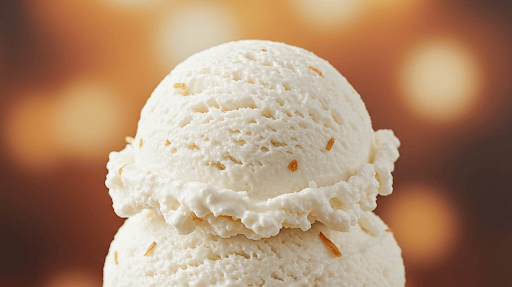Unilever's Innovation in Plant Based Ice-Cream with Mycoprotein
ALTERNATIVE PROTEINSDAIRY & ALTERNATIVES


This is an AI generated illustration and does not represent actual product or service.
Unilever has recently filed a patent application on a technology that promises to revolutionize the non-dairy frozen confection market. With the growing consumer demand for plant-based and dairy-free products, Unilever’s invention addresses the need for non-dairy frozen desserts that deliver the creamy texture and rich mouthfeel of traditional ice cream. At the heart of this innovation is mycoprotein, a sustainable and nutritious fungal protein that offers a unique solution to the challenges of formulating non-dairy frozen confections.
The Challenge of Non-Dairy Frozen Confections
The rise of plant-based diets has driven demand for dairy-free alternatives across the food industry. However, creating non-dairy frozen confections that match the sensory experience of traditional ice cream has proven challenging. Many plant-based proteins, such as soy or pea protein, can introduce off-flavors or undesirable textures, making it difficult to achieve the creamy consistency and neutral taste that consumers expect. Additionally, the absence of dairy fats and proteins often results in products that lack the richness and stability of conventional ice cream.
Unilever’s patent addresses these challenges by leveraging mycoprotein, a protein-rich biomass derived from fungal mycelium, to create non-dairy frozen confections with superior texture, flavor, and stability.
The Mycoprotein Advantage
Mycoprotein, produced through the fermentation of fungi such as Fusarium venenatum, is a sustainable and nutritious ingredient. It is rich in protein, dietary fiber, and low in fat, making it an ideal candidate for plant-based food formulations. Unilever’s innovation lies in the use of mycoprotein fibrils with a specific fibril length of less than 50 micrometers (µm). These fibrils, when incorporated into frozen confections, help stabilize the product’s microstructure, resulting in a creamy, smooth texture that mimics traditional ice cream.
Key Features of the Invention
1. Mycoprotein Biomass: The non-dairy frozen confection contains 0.1 to 2.5 wt% of mycoprotein biomass, with fibrils measuring less than 50 µm in length. This specific fibril length is critical for achieving the desired texture and stability.
2. Improved Texture and Mouthfeel: The mycoprotein fibrils create a network that stabilizes the frozen confection, preventing the formation of large ice crystals and ensuring a smooth, creamy consistency.
3. Neutral Flavor Profile: Unlike some plant-based proteins, mycoprotein has a mild flavor that does not overpower the taste of the frozen confection. This allows for the creation of a neutral base that can be easily flavored to suit consumer preferences.
4. Nutritional Benefits: Mycoprotein is a high-quality protein source that also provides dietary fiber, making it a nutritious addition to non-dairy frozen desserts.
5. Versatility: The invention can be applied to a wide range of frozen confections, including ice cream, sorbets, and frozen yogurts, offering flexibility for product development.
The Manufacturing Process
Unilever’s patent application also outlines a streamlined process for producing these non-dairy frozen confections:
1. Microfluidization: A suspension of mycoprotein biomass is microfluidized to break down the fibrils to the desired length (less than 50 µm). This step is crucial for achieving the optimal texture and stability.
2. Premix Preparation: The microfluidized mycoprotein is combined with other frozen confection ingredients, such as vegetable fats (e.g., coconut oil), sugars, stabilizers, and emulsifiers, to create a premix.
3. Freezing: The premix is frozen using standard ice cream manufacturing equipment, resulting in a non-dairy frozen confection with a creamy texture and excellent melt resistance.
Sensory and Physical Properties
Unilever’s invention has been tested to ensure superior sensory and physical properties. Key findings include:
- Creamy Texture: The mycoprotein-based frozen confections exhibit a smooth, creamy texture that rivals traditional ice cream.
- Improved Melt Resistance: The products show excellent stability under temperature abuse, maintaining their structure and texture even after repeated freeze-thaw cycles.
- Enhanced Flavor: The neutral flavor profile of mycoprotein allows for the creation of a wide range of flavors, from classic vanilla to more adventurous options.
Consumer Benefits
Unilever’s mycoprotein-based frozen confections offer several benefits to consumers:
- Dairy-Free: Ideal for lactose-intolerant individuals or those following a vegan or plant-based diet.
- Sustainable: Mycoprotein is produced through fermentation, a process that requires fewer resources and generates lower greenhouse gas emissions compared to traditional dairy farming.
- Nutritious: High in protein and fiber, these frozen confections provide a healthier alternative to traditional ice cream.
Unilever’s mycoprotein innovation represents a significant advancement in the non-dairy frozen confection market. By addressing the challenges of texture, flavor, and stability, this technology opens up new possibilities for creating plant-based frozen desserts that meet consumer expectations.


